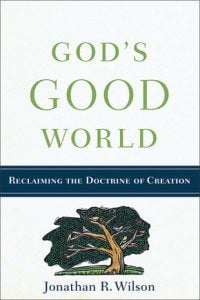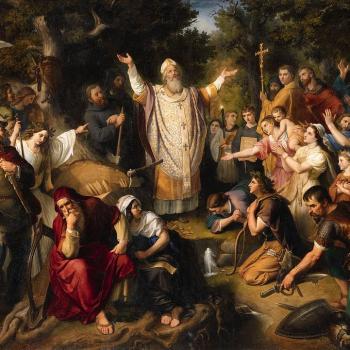In Jonathan R. Wilson’s recent book God’s Good World, Dr. Wilson tries to form a doctrine of “creation,” through which he frames the whole of the cosmos, and human beings in particular within a theological framework. This is not a “new” project, in fact theologians and philosophers have been thinking and writing about this for a very long time. At other points in time cosmology was a main focus of preaching and teaching and learning. This however, has been lost over the past few centuries within many of the protestant churches, where Jonathan Wilson finds himself, and in this book he begins to move toward reclaiming it.
Johnathan believes that theology abandoned a robust doctrine of creation as the empirical sciences began to make claims upon understanding the natural world. He bemoans this relinquishment of the field of cosmology, and believes the lack of voices on issues of cosmology have produced unreflective perspective on human sexuality within the church, and dangerously disconnected theologies about care for the environment.
Although I agree with much of what Jonathan Wilson says about this, I also believe that the readiness of the churches to acquiesce to the sciences was partially the result of it’s abandonment of a sacramental understanding of creation and God’s incarnational life with us through these means of Grace. Because Catholic and Orthodox Christians have NOT lost this understanding, there has tended continue to keep the theology of cosmology at the forefront. This is perhaps why Catholics and Orthodox have been some of the strongest supporters of environmentally oriented legislation and actions.
In Wilson’s book he believes that reclaiming the doctrine of creation should begin with a focus on the Bible. He uses the reality seen in the book of revelation as the starting point and uses it as a lens through which he moves through the rest of the Bible. He sees God life as the grounds for all life in creation, and revelation gives us that eschatological perspective (I don’t know if Wilson realizes it, but he’s starting to talk like a liturgist at this point).
At the end he begins to address the issues we face and how to approach them through the “doctrine of creation.” Looking at our bodies, the posture of meekness as creatures in the world, and living life in the rhythms of Sabbath. In this section he seems to be setting up a second level upon his foundations, from which others will be able to better articulate and determine the appropriate Christian stance on the many issues in our world today which are tied to cosmology.
In my opinion, the world is in desperate need of a vibrant cosmological theology. We has too long allowed bad theology surrounding creation to to dominate the way that God’s world has been understood, and this bad theology has been used to justify abuse of both the planet and one another. I think this book is a decent start at an essential project. My primary critique is that it does not have the sacramental focus I believe is necessary for a full and vibrant perspective. However given the authors baptist background, this is not surprising.













